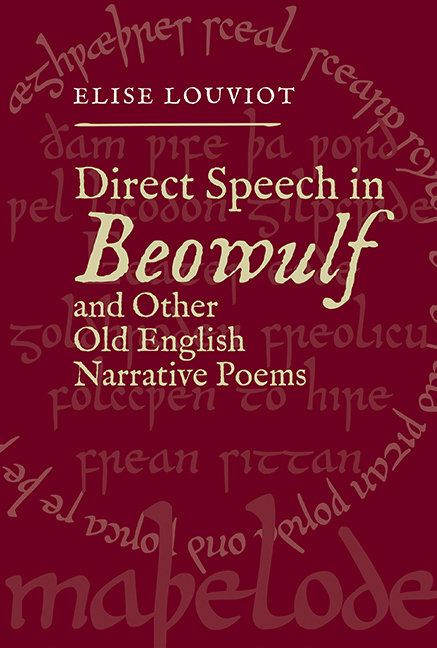Book contents
- Frontmatter
- Contents
- List of Figures
- Acknowledgements
- Introduction
- 1 The Form of Direct Speech
- 2 The Content and Context of Direct Speech
- 3 A Lack of Subjectivity?
- 4 Archetypal Subjectivity
- 5 A Problem with Voices
- 6 A Problem with Point of View
- 7 Impossible Irony
- Conclusion
- Bibliography
- Index
- Anglo-Saxon Studies
- Frontmatter
- Contents
- List of Figures
- Acknowledgements
- Introduction
- 1 The Form of Direct Speech
- 2 The Content and Context of Direct Speech
- 3 A Lack of Subjectivity?
- 4 Archetypal Subjectivity
- 5 A Problem with Voices
- 6 A Problem with Point of View
- 7 Impossible Irony
- Conclusion
- Bibliography
- Index
- Anglo-Saxon Studies
Summary
What needs to be proved is that Old English literature has a value different in kind from other types. And here the fact that the verse tradition is a dead one can, paradoxically, be an advantage. For in a way Old English poetry presents a challenge to any theory of literature based on our modern tradition from Spenser onwards.
As noted by Zumthor, there is something paradoxical about the medieval world in that, even though our own world can be said to originate from it, so much has happened and so much has changed since the early Middle Ages that it can seem as if we no longer have any connection at all to that distant era. An important consequence of that fact is that any analysis of an early medieval text is fraught with risk. None of the concepts we use can be assumed to have eternal or universal relevance, so they must all be evaluated carefully before they can be applied to such texts. This can be seen as an obstacle, but it is also possible to take a more positive view of the issue and, like Shippey (as quoted at the beginning of this chapter), to see it as an advantage and an opportunity.
Direct Speech was long regarded in literary criticism as the simplest form of Represented Speech, requiring little explanation or analysis, unlike its supposedly more sophisticated counterpart, Free Indirect Speech. In the past decades, linguists have shown that there was no reason to regard any form of Represented Speech as more natural or simple than the others. Interestingly, but perhaps not entirely surprisingly, this renewed view of Represented Speech has come for the most part from two directions: medievalists and specialists of the spoken word, i.e. from scholars with a keen interest in orality.
To give a ‘voice’ to the words of another is no easy feat and it can never be the same as having another person actually speak in their own words and their own voice. The ease with which modern readers accept the idea that an author can create a distinct narrator-persona and any number of fully fledged characters, each with their own idiosyncratic personality, manner of speaking and point of view, is the product of convention and long habit – there is nothing natural or evident about it.
- Type
- Chapter
- Information
- Direct Speech in Beowulf and Other Old English Narrative Poems , pp. 251 - 261Publisher: Boydell & BrewerPrint publication year: 2016



